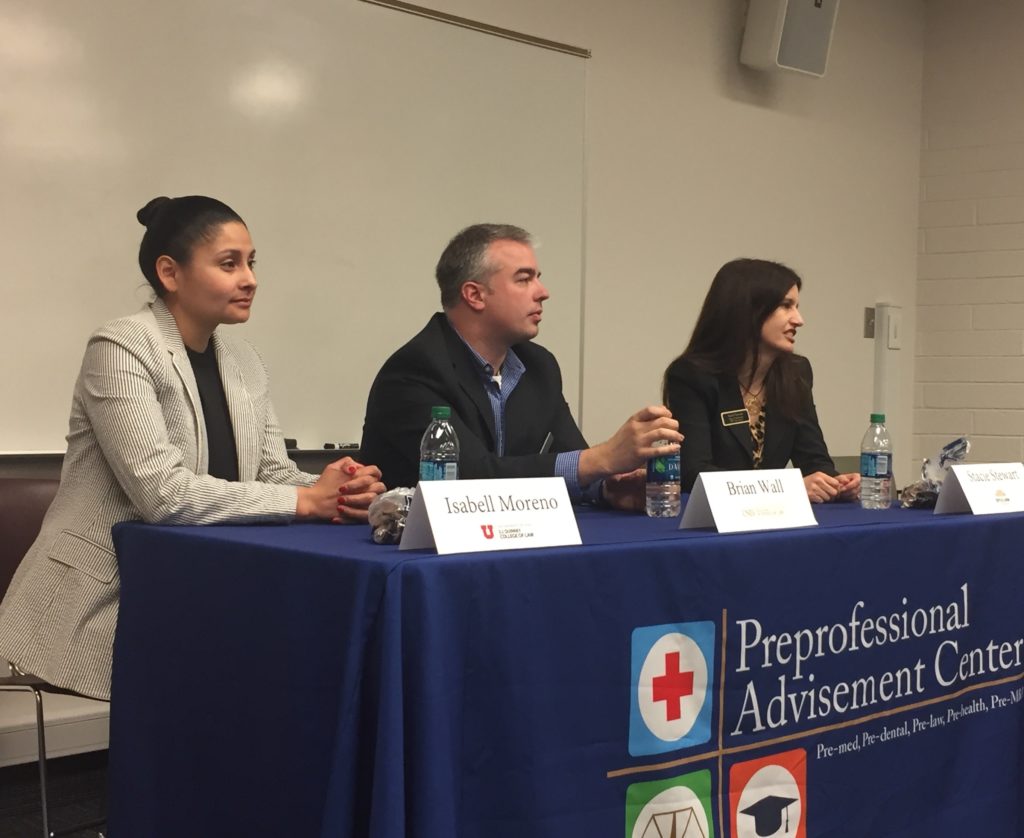
Law school representatives from BYU, the University of Utah and the University of Nevada, Las Vegas shared law school admission tips and answered questions during a question and answer session held on the BYU campus Thursday, Feb. 7.
Those on the panel were BYU Law School Dean of Admissions Stacie Stewart, University of Utah Associate Director of Admissions Isabell Moreno and University of Nevada, Las Vegas Director of Admissions Brian Wall.
One of the most commonly asked questions the panel received was what undergraduate students should study to boost their chances of getting into their dream school. The panel said students shouldn’t feel pressured to pick a major just because it seems like a conventional path to law school.
“There is no one major that you need to major in,” Wall said. “We have dance majors, electrical engineers and every major. Please don’t feel like you have to major in economics, history or English. We care less about what your major is than how you did in your major and how you met your academic goals.”
While experiential diversity is a valuable asset in a law school applications, both Stewart and Moreno emphasized the importance of gaining experience in critical reading and writing as an undergraduate student.
“Working in law — 95 percent of the time you will be reading, writing and researching,” Moreno said. “You want to start honing your grammar, reading and analyzing skills. It’s crucial if you want to learn to excel in law school and a legal career.”
Wall, a BYU Law grad, urged students to get involved in meaningful pre-law experiences on campus.
“BYU has one of the most extensive pre-law programs in the country,” Wall said. “The pre-law journal is also an awesome way to hone your reading and writing skills and it will look really good on your application.”
BYU offers a variety of popular pre-law courses for undergraduate students. Students interested in law may also join the Pre-Law Student Association to start gaining experience.
Stewart said the LSAT is weighted most heavily by admissions panels at around 60 percent with GPA ranking second in importance.
For undergraduate students who may not have planned to apply to law school, BYU Law has implemented new policies that allow students to apply using their GRE score or to qualify to apply with a LSAT exemption policy under certain academic requirements.
Stewart advised students to do their research and use their GRE score if they feel it emphasizes the skills they gained as an undergraduate better than the LSAT.
The panel advised students to be honest and original in the written portion of the application. Mistakes many students make include focusing too much on their Latter-day Saint missionary service in their personal statement or using an addendum inappropriately.
“Don’t make your mission the focal point of your application, in this area it doesn’t help you to stand out,” Wall said. “We want to see what experiences you’ve had that make you really unique and why that will make you good in law.”
Moreno added that students who need to include an addendum should feel comfortable clarifying how they will contribute to the diversity of the school or to explain extenuating GPA circumstances.
Wall said many students mistakenly believe they need several years of work experience after graduation before applying to a graduate program. Wall said students who have pushed themselves to reach their academic and career goals as undergraduates should feel confident applying to law school even if they are straight out of college.
“We understand if you’re straight out of college the jobs you may have had are in college or summer jobs,” Wall said. “We look at your application with an understanding of your stage of life. We want to see that you have excelled in what you’ve done so far.”




